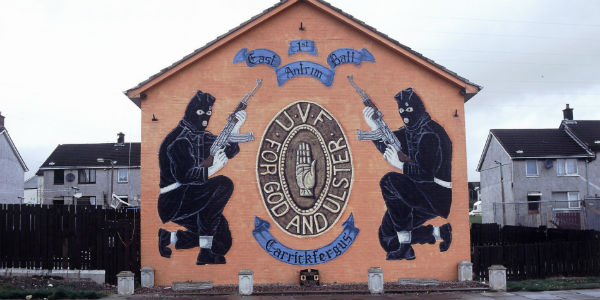How evangelical religion contributed to peace in Northern Ireland
ECONI – an evangelical Protestant organisation – played a key role in establishing peace in Northern Ireland. Gladys Ganiel explains how its effectiveness rests in part on its credibility: ECONI’s evangelical identity provided it with a legitimacy that some ecumenical peace-building organisations lacked.

A mural in Carrickfergus. Photo: Wikimedia Commons via a CC-BY-SA 3.0 licence
Samuel Huntington’s Clash of Civilisations emphasised the destructive capacities of religion, contributing to a popular consciousness that religion is simply unable to contribute to peace. Others have recognised that religion can be both a source of conflict and of peace, with Northern Ireland considered a case where religion has played these ambivalent roles.
But the most effective faith-based peacebuilders in Northern Ireland were not the ‘ecumenical’ activists who sought to downplay religious differences between Catholics and Protestants. Rather, the most effective faith-based peacebuilders were evangelical Protestants.
Like Muslims today in the ‘War on Terror,’ evangelicals are often stereotyped as uncompromising and divisive. But in Northern Ireland, some evangelicals focused not on transcending religious identities but on critiquing their own tradition for its role in conflict. In the process, they changed some of the religious aspects of Protestant communal identity, making it more outward-looking and reconciliatory.
A crucial lesson is that faith-based identity change is most effective if it comes from within religious groups themselves. Religion is more likely to contribute to peace if activism is a result of people of faith acting out of religious conviction – rather than responding to outside pressures from government, media and popular opinion.
The Troubles in Northern Ireland (circa 1968-1998) saw two oppositional ‘communities’ describing themselves both in religious and political terms: Catholics-Nationalists-Republicans and Protestants-Unionists-Loyalists. And while the Troubles were not about religious doctrines, both communities used religious ideas, symbols and rituals to define themselves over and against each other.
Religion was especially important for Protestants, who feared what they perceived as a politically-powerful Catholic Church in the Republic of Ireland. In the event of a united Ireland, they felt that their Protestant ‘liberties’ would be curtailed by the Catholic Church. Protestant identity also depended on an ideology informed by Calvinist conceptions of the covenant, the chosen people and the promised land. These concepts were interpreted to mean that Protestants had a ‘divine right’ to hold power in the northeast of the island of Ireland. Protestant ideology too was informed by the evangelical idea that ‘real’ Christians must be ‘born again’, a stance that made almost all Catholics, by definition, not ‘really’ Christians.
Sociologist Steve Bruce went so far as to say that evangelicalism formed the ‘core’ of Protestant ethnic identity. Bruce argued that the cultural importance of evangelicalism within the wider Protestant community was what explained the remarkable success of the preacher-politician Rev Ian Paisley (1926-2014) – a man who not only founded his own denomination, the Free Presbyterian Church, but also started what has now become the largest political party in Northern Ireland, the Democratic Unionist Party (DUP).
Paisley’s reputation as something of an elder statesman in his later years should not distract us from how he was perceived for most of his life: as a religious extremist stirring up violence. Paisley knew how to push the buttons that would activate the evangelical ‘core’ of the wider Protestant ethnic identity, mixing political and religious rhetoric in his political speeches.
So if religion mattered more in terms of its relationship to the conflict for Protestants than it did for Catholics, it follows that there was greater potential for faith-based peace activism to be effective among Protestants. This idea is captured in a maxim: If religion has been part of the problem, it should be part of the solution.
An organisation called Evangelical Contribution on Northern Ireland (ECONI) is perhaps Northern Ireland’s best example of how faith-based activists contributed to peace. ECONI was formed in the mid-1980s as a direct counter to ‘Paisleyism.’ In my own research, I spoke to people who said that the ideas they first heard through ECONI led to changes in their identity and a commitment to engage in peacebuilding. ECONI encouraged people to first be self-critical of their own religious tradition – and then to use resources from within that tradition to change it.
There’s an old slogan within the Protestant community, which could be said to reflect the ideal relationship between church and state within covenantal Calvinism: ‘For God and Ulster.’ ECONI’s first public act turned that slogan on its head. It was an open letter in the Belfast Telegraph titled ‘For God and His Glory Alone’. ‘For God and His Glory Alone’ was later distributed as a booklet, with five printings and more than 10,000 copies. More than one-third of all Protestant congregations in Northern Ireland participated in ECONI initiatives.
‘For God and His Glory Alone’ illustrates how ECONI was self-critical of the evangelical, Calvinist tradition. ECONI capitalised on evangelicalism’s high regard for the Bible by justifying its critique of Northern Irish versions of covenantal Calvinism through fresh interpretations of scripture.
ECONI also developed religious ideas that were relatively unique within Northern Irish evangelicalism. It was inspired by engagement with the Anabaptist tradition – including figures like John Howard Yoder and Stanley Hauerwas – and drew on the Anabaptist tradition to argue for a separation between Protestantism and Unionist political power, and to advocate pacifism or non-violence in almost all circumstances.
Finally, ECONI’s self-critical reflection on Northern Irish evangelicalism led to repentance – not asking the ‘Other’ to repent but rather confessing the ‘sins’ of its own community. This opened doors for relationships with people from Catholic backgrounds.
ECONI’s effectiveness rested in part on its credibility: ECONI’s evangelical identity provided it with a legitimacy that some ecumenical peacebuilding organisations lacked. It might be assumed that policy makers and secular peacebuilding NGOs should engage with moderate religious groups that are attempting to transcend sectarian identities – like ecumenists. Such a strategy would have excluded ECONI.
So it was remarkable that during the 1990s ECONI received substantial funding from the British state through the Community Relations Council. To some extent ECONI had to tailor its message to appeal to this funding body, but it was still able to retain its evangelical identity. Government support enabled ECONI’s programmes to have a deeper and wider impact. The lesson that can be learned is that in conflicts with religious dimensions, it is crucial for funders and policy makers to support religious organisations that are legitimate and effective – not just ones that seem to suit the Government’s agenda in every way.
In 2005 ECONI changed its name to Contemporary Christianity and reduced its programming. It no longer receives core funding from the Community Relations Council and it is not nearly as visible as ECONI was during its heyday.
Contemporary Christianity is not unusual in this regard. Other faith-based organisations and churches, not to mention secular NGOs that were active in peace work during the Troubles, also have retreated from view.
Today, Northern Ireland stumbles from political crisis to political crisis, and reconciliation between communities remains elusive. Perhaps a final lesson to be learned is that ECONI – and other organisations like it – should have remained just as deeply engaged in promoting reconciliation, even after the worst of the violence had subsided.
This post represents the views of the author and not those of Democratic Audit. It first appeared at LSE Religion in the Public Sphere.
 Gladys Ganiel is Research Fellow in the Senator George J Mitchell Institute for Global Peace, Security and Justice at Queen’s University Belfast. Her books include Evangelicalism and Conflict in Northern Ireland (Palgrave 2008) and Transforming Post-Catholic Ireland (Oxford 2016). She blogs at www.gladysganiel.com.
Gladys Ganiel is Research Fellow in the Senator George J Mitchell Institute for Global Peace, Security and Justice at Queen’s University Belfast. Her books include Evangelicalism and Conflict in Northern Ireland (Palgrave 2008) and Transforming Post-Catholic Ireland (Oxford 2016). She blogs at www.gladysganiel.com.





 Democratic Audit's core funding is provided by the Joseph Rowntree Charitable Trust. Additional funding is provided by the London School of Economics.
Democratic Audit's core funding is provided by the Joseph Rowntree Charitable Trust. Additional funding is provided by the London School of Economics.